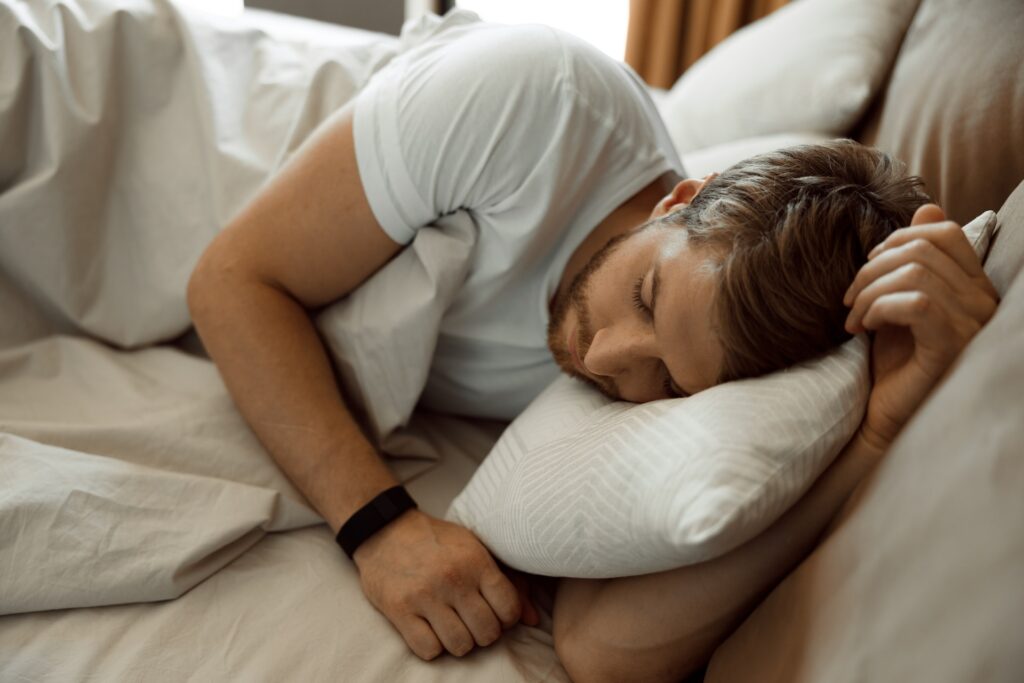
Understanding the Relationship Between eTRT, Sleep, and Testosterone
Adequate sleep is crucial for overall health and well-being; however, its impact on hormone balance, specifically testosterone levels, is often overlooked. Sleep plays a vital role in regulating testosterone production, and poor sleep can lead to imbalances and contribute to the development of Low T. On the other hand, Low T can negatively impact sleep quality, further exacerbating the issue. As a result, understanding the intricate relationship between sleep, testosterone levels, and eTRT treatment is essential for men seeking to optimize their hormone balance and achieve better overall health.
In this article, we delve into the connection between sleep and testosterone, discussing how they influence each other and examining the role that telehealth testosterone therapy, such as RISE Men’s Health’s eTRT program, can play in improving sleep and hormone balance. By offering comprehensive insights into sleep’s impact on testosterone levels and the effectiveness of eTRT, we aim to empower men in their quest for improved sleep, optimized hormone balance, and optimal well-being.
Through this exploration of sleep, testosterone, and eTRT, we provide an educational resource for men seeking guidance on enhancing their sleep quality, hormone balance, and overall well-being.
The Science Behind Sleep and Testosterone: How They Affect Each Other
Sleep plays a crucial role in hormone production, particularly testosterone. Research indicates that testosterone levels follow a diurnal rhythm, with the highest levels occurring during sleep, particularly during the rapid eye movement (REM) stage of the sleep cycle. As a result, consistently poor sleep can negatively impact testosterone levels and contribute to hormonal imbalances and Low T.
Conversely, Low T can disrupt sleep quality and lead to sleep disorders such as insomnia and sleep apnea. This reciprocal relationship between testosterone and sleep presents challenges for men seeking to optimize hormone balance and overall well-being.
Sleep Disorders and Low Testosterone: Causes and Solutions
Several sleep disorders are associated with Low T, including sleep apnea and insomnia. These disorders can hinder testosterone production and worsen symptoms of Low T. Identifying and addressing these sleep disorders is an essential component of any testosterone optimization strategy.
- Obstructive Sleep Apnea (OSA): This common sleep disorder is characterized by repeated interruptions in breathing during sleep, often leading to reduced sleep quality and lower testosterone levels. Working with a medical professional to diagnose and manage OSA can help improve sleep quality and, consequently, boost testosterone levels.
- Insomnia: Insomnia is characterized by difficulty falling asleep or staying asleep and can significantly impact testosterone levels. Seeking professional guidance to identify and address the root causes of insomnia can support improved sleep quality and hormone balance.
How eTRT Can Improve Sleep Quality: The Role of Hormone Optimization
Telehealth testosterone therapy, such as RISE Men’s Health’s eTRT program, can play a significant role in improving sleep quality by helping to restore testosterone levels to their optimal range. A hormonal balance resulting from eTRT treatment can:
- Reduce sleep disturbances: By addressing Low T and its associated symptoms, eTRT can help to reduce sleep disruptions and promote more restful sleep.
- Support healthy sleep cycles: eTRT treatment can help regulate the diurnal rhythm of testosterone production, thus supporting a healthy sleep-wake cycle and overall sleep quality.
- Promote overall well-being: Optimized testosterone levels through eTRT can improve mood, energy, and overall well-being, contributing to a more restful and restorative sleep experience.
Tips for Maintaining Healthy Sleep Habits During eTRT Treatment
In addition to eTRT treatment, it’s essential to maintain healthy sleep habits to support optimal hormone balance and overall well-being. Here are some practical tips for enhancing sleep quality during eTRT treatment:
- Establish a sleep schedule: Consistency is key when it comes to sleep. Set a regular bedtime and wake time, allowing for at least 7-9 hours of rest each night.
- Create a relaxing bedtime routine: Engaging in calming activities before bed, such as reading or meditating, can signal the body to wind down and prepare for rest.
- Limit exposure to screens: The blue light emitted by electronic devices can interfere with the production of the sleep hormone melatonin. Limit screen use in the hour before bed to encourage the body’s natural sleep-wake cycle.
- Ensure a sleep-friendly environment: A cool, dark, quiet bedroom can enhance sleep quality. Consider blackout curtains, white noise machines, or a comfortable fan to create optimal sleeping conditions.
Maximizing Your Sleep Environment for Testosterone Production
Your sleep environment plays a crucial role in promoting quality sleep and supporting optimal testosterone production. By optimizing your bedroom for rest and relaxation, you can help support hormone balance and overall well-being. Consider these tips for maximizing your sleep environment:
- Invest in a high-quality mattress: A comfortable and supportive mattress can improve sleep quality and overall health.
- Choose appropriate bedding: Opt for breathable and responsive bed linens that offer comfort and temperature regulation throughout the night.
- Frequency and duration of sleep: Try to have consistent sleep patterns, aiming for 7-9 hours per night, as this helps maintain higher testosterone levels.
The Future of Sleep and Testosterone: Balancing Hormones for Restful Nights and Revitalized Days
Achieving optimal hormone balance through eTRT treatment and healthy sleep habits can improve overall well-being and quality of life. By understanding the intricate relationship between sleep, testosterone, and eTRT, men can develop targeted strategies to enhance their sleep quality and address the challenges of Low T.
Embrace the future of hormone optimization with eTRT treatment from RISE Men’s Health, and prioritize sleep as a crucial component of overall health. By committing to better rest, you can support your journey toward rejuvenated days, revitalized nights, and a brighter outlook on life.
